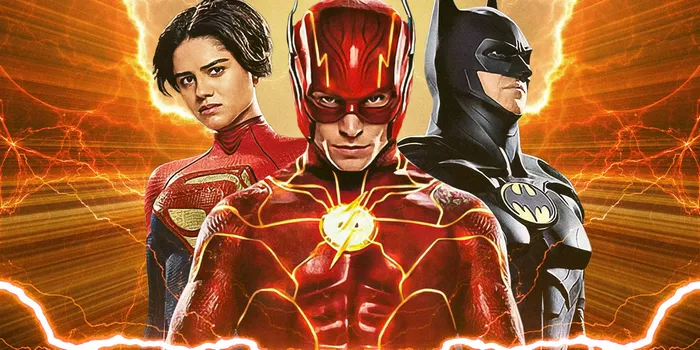DC fans had high hopes for “The Flash” movie, envisioning it as a potential redemption for the franchise after the critical and financial disappointment of “Justice League” in 2017. However, recent developments have sparked concerns among fans, suggesting that the creative team behind the movie has not learned from past mistakes. In this article, we delve into the revelations surrounding “The Flash” and explore how the lack of lessons learned from previous failures could impact the fate of this highly anticipated superhero film.
The $240 Million “Justice League” Disaster
Back in 2017, “Justice League” hit theaters with enormous expectations, bringing together iconic DC superheroes such as Superman, Batman, Wonder Woman, and The Flash. Unfortunately, the film fell far short of those expectations, both critically and financially. Plagued by a troubled production, including a last-minute change of director, “Justice League” struggled to find its identity, resulting in a tonally inconsistent and underwhelming final product. The film’s massive budget of $240 million only added to the pressure to deliver a box office hit, but it failed to meet those expectations, leaving DC in a precarious position.
The Lack of Course Correction
After the “Justice League” disappointment, fans hoped that DC would take the necessary steps to course correct and deliver more cohesive and well-received films. However, recent news and leaks surrounding “The Flash” indicate a concerning lack of lessons learned from past mistakes. The film is rumored to follow a convoluted storyline involving time travel and multiverse elements, which risks repeating the same pitfalls that befell “Justice League.” DC appears to be banking on elaborate concepts and spectacle, but without a strong foundation of character development and narrative coherence, the movie may struggle to resonate with audiences.
Creative Differences and Director Troubles
One of the primary reasons for “Justice League’s” failure was the turmoil during its production, with director Zack Snyder stepping down due to personal reasons, and Joss Whedon taking over for reshoots. This led to a clash of creative visions and a disjointed final product. Unfortunately, “The Flash” has not been immune to similar troubles. The film has faced its fair share of directorial changes and creative differences, with multiple directors attached to the project before finally settling on Andy Muschietti. While Muschietti is a talented filmmaker, the constant changes may have introduced uncertainty and instability into the film’s development, potentially impacting its overall coherence.
The Risk of Overcrowding
One of the criticisms leveled at “Justice League” was its attempt to juggle too many characters and plotlines within a single film. With “The Flash” set to introduce the concept of the multiverse and bring back previous iterations of Batman, including Michael Keaton’s iconic portrayal, there is a risk of overcrowding the narrative. While the idea of exploring alternate realities and iconic versions of Batman is intriguing, it must be handled with care to avoid overwhelming the audience and diluting the focus on Barry Allen’s character journey.
The Importance of Character Development
One of the keys to the success of superhero films is the emotional investment audiences have in the characters. “Justice League” faltered in this aspect, offering limited character development and failing to establish strong connections with its protagonists. “The Flash” must learn from this mistake and prioritize Barry Allen’s growth and evolution as a hero. Ezra Miller’s portrayal of The Flash has the potential to be a highlight of the DCEU, but it requires a well-crafted story that delves into his motivations, struggles, and personal growth.
The Need for a Cohesive Vision
A common thread running through successful superhero franchises, such as the Marvel Cinematic Universe, is a cohesive vision that guides the overall narrative and character arcs. With “The Flash,” DC must ensure that the film aligns with the larger DCEU and establishes a clear direction for the future of the franchise. While the multiverse concept offers exciting opportunities for storytelling, it must serve as a means to enhance the narrative, not overshadow it.
Conclusion
“The Flash” carries the weight of high expectations on its shoulders as DC seeks redemption from the failures of “Justice League.” However, recent revelations indicate a concerning lack of lessons learned from past mistakes. To succeed, “The Flash” must prioritize character development, avoid overcrowding the narrative, and maintain a cohesive vision for the future of the DCEU. Only then can it hope to rise above the shadow of its $240 million predecessor and deliver the thrilling superhero experience fans deserve. As the film’s release date approaches, DC has a chance to course correct and demonstrate that “The Flash” has indeed learned from past disasters.
RELEATED READING:
-
Superman Legacy: MCU Element Joins DC Universe Fan Trailer
-
“The Creator”: Story Details and Trailer Analysis
-
Wonka’s Casting Controversy: Authentic Representation in Hollywood
-
Scream 7: Ghostface’s Return – Release Date, Story & Everything We Know
-
Meg 2: The Trench Surprises Oppenheimer at the Box Office

